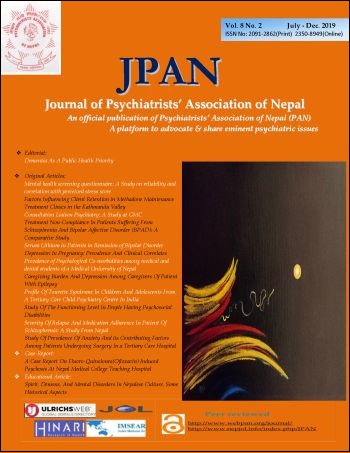Study Of The Functioning Level In People Having Psychosocial Disabilities
DOI:
https://doi.org/10.3126/jpan.v8i2.28026Keywords:
Functioning Level, Psychosocial Disabilities, NepalAbstract
Introduction: Mental health is state of wellbeing in which as individual realizes in his or her abilities, can cope with the normal stresses of life, can work productively and fruitfully, and is able to make a contribution to his or her community (WHO, 2004). Schizophrenia is a significantly disabling disease that affects social family psychological, vocational and occupational functioning (Lyngdoth, L. et al, 2016). Depressive disorders often start at a young age; they reduce people’s functioning and often are recurring (Marcus et al., 2012). Studies have shown decreased functioning ability in people having mental illness in Nepal. This study was done to explore the impact of mental illness in their daily functioning abilities.
Material And Method: A cross-sectional survey was conducted among 120 people suffering from mental illness (psychosocial disabilities) for more than six months. Mental health social workers who were facilitating mental health self-help group of treatment seeking mental health patients in the health facilities were trained and supervised during data collection. Selected participants were informed about research objectives and received consent for the study. Nepali adopted WHO-DAS-2 (Thapa et al, 2005) was used to collect both demographic and functioning abilities of research participants. Data were analysed using SPSS 20th version mainly for descriptive statistics.
Results: Participants' age ranged from 18-60 years with mean age 29.53 (SD±10.8), with gender distribution 58.3% female and 41.7% male. People with psychosocial disabilities experienced in an average 9.45 days difficulty, average 6.95 days they couldn't do daily work and minimized work for average 3.55 days in the month. Female with mental health problems experienced more difficulties in daily life functioning (S1-S12 items in WHO-DAS) where moderate to severe level difficulties observed than male with mental health problems. Emotional effect due to health problems, talking with unknown people, difficulties in friendship area and doing daily activities were affected significantly statistically (p=0.01, 0.05, 0.04 and 0.02). Ethnicity and gender is significantly correlated with total affected days (r=.221, -.180 p= 0.05, table 3). Gender and total affected working days is correlated but not significant statistically.
Conclusion: Level of functioning is affected significantly in people having psychosocial disabilities; impairment is higher in female, people suffering with severe form of mental illness. Findings indicate need of awareness in mental health. Further research is necessary in larger and representative population including care-taker of mentally ill person.
Downloads
Downloads
Published
How to Cite
Issue
Section
License
This license enables reusers to distribute, remix, adapt, and build upon the material in any medium or format, so long as attribution is given to the creator. The license allows for commercial use.




